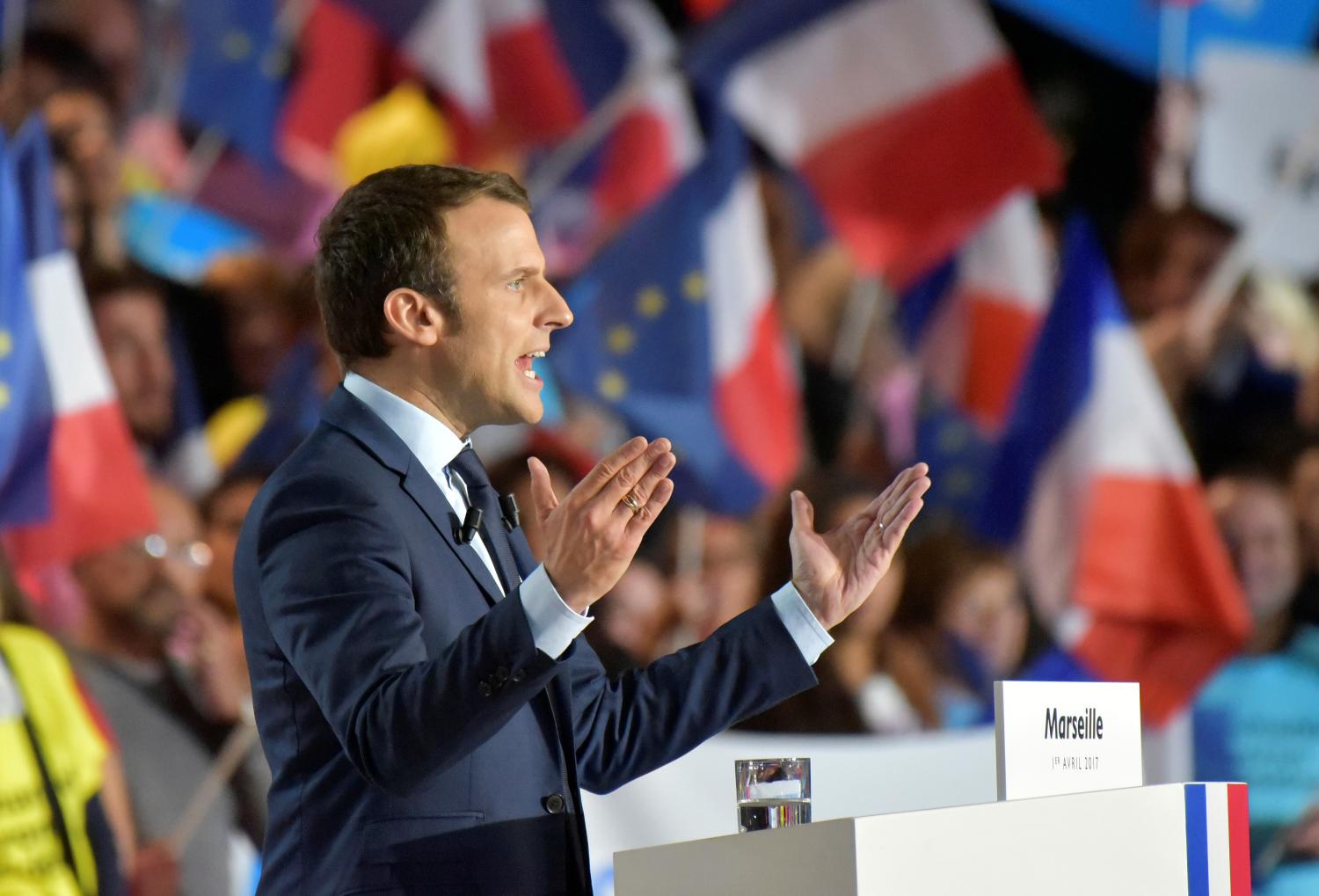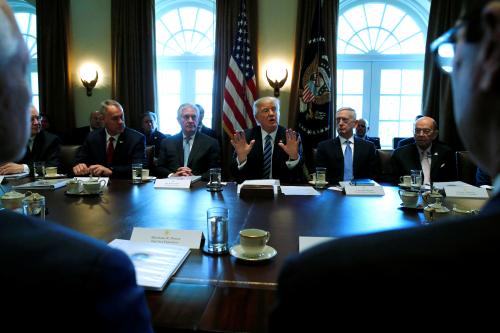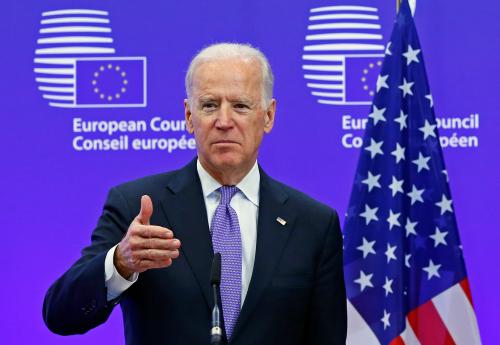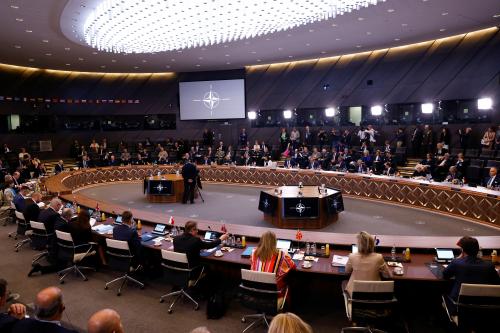For over 70 years, the United States has underwritten Europe’s security and promoted its economic and political wellbeing while asserting that a stable, prosperous, and peaceful Europe was in America’s national interest. The trans-Atlantic relationship, with the NATO alliance as its security foundation, was considered a cornerstone of American power and global leadership. However, in recent years, as new threats to Europe’s security have emerged, uncertainty has also arisen over the durability of the U.S. commitment to the trans-Atlantic alliance. A Europe now beset by myriad external and internal challenges—including intimidation by an assertive and revisionist Russia, escalating fears of jihadi terrorism, massive migration unleashed by conflict and disorder in the Middle East, doubt and disunity in the aftermath of the UK’s decision to leave the European Union, and the rise of populist, Euro-sceptic, anti-immigrant, and nationalist sentiments and political parties—must also face the reality of a new U.S. administration that has promised to put America first. In the words of U.S. Defense Secretary James Mattis as he addressed NATO allies in February, “Americans cannot care more for your children’s future security than you do.”
The evolving trans-Atlantic alliance and the emerging threats it faces were the focus of discussion at an event hosted by the Brookings Institution’s Center for the United States and Europe (CUSE) on March 1. The event—which culminated a two-year series of high-level workshops on the European security architecture—explored Europe’s crisis management capabilities and institutions. Experts from both sides of the Atlantic discussed geopolitical developments in and around the continent and considered what these challenges portend for the future of the European security order.
Senior Fellows Constanze Stelzenmüller and Tom Wright moderated the panels, and CUSE Director Fiona Hill delivered introductory remarks.
The opening panel began by assessing what are the “European answers” to these “European challenges”? According to Gwendolyn Sasse, the director of the Center for East European and International Studies, Europe’s dilemmas about how to address crises are not always linked to disagreements over foreign policy, but also stem from domestic considerations.
https://www.youtube.com/watch?v=WrKuzC0iQuw?t=26m50s
Matthew Rojansky, director of the Kennan Institute, offered his perspective on how Russia viewed trans-Atlantic developments, describing the Kremlin’s posture as a “defensive crouch.” He explained that “Russians are not looking to provoke any additional crises, but they are mostly ready for further confrontation.” According to Rojansky, Russians are in a “strange headspace,” as they realize that their vision for the international order has now largely come to pass.
https://www.youtube.com/watch?v=WrKuzC0iQuw?t=31m22s
Asked to identify the pressing challenges for Europe, Chris Chivvis, associate director at the RAND Corporation, named three key concerns:
- The need for more resources, including law enforcement and intelligence-sharing, to counter “euro-terrorism,” flagging out the particular danger posed by migrants and returning foreign fighters who could carry out more violent attacks in Europe;
- The rise of Russia as a military power and the areas of contention that have caused, and will continue to cause, a rift between Russia and the West (ranging from differing attitude towards multiculturalism to the Kremlin’s desire to re-establish a “19th century relationship” with the United States and the EU);
- The growing impulse to turn inward and decouple from the United States, especially on defense and security, that has been strengthened by various isolationist trends in Europe.
Chivvis’ concluding remarks were particularly supportive of an Atlanticist approach, issuing a note of warning that moving away from trans-Atlantic cooperation would signify a major victory for the opponents of the rules-based international system.
https://www.youtube.com/watch?v=WrKuzC0iQuw?t=42m12s
Might the United States and Europe break with the past on trans-Atlantic cooperation and a collective appreciation of the importance of European security? According to Julie Smith, director of the Strategy and Statecraft Program at the Center for New American Progress, it is too soon to know. Some of the Trump administration’s cabinet members find value in the current international system, and others believe that “we are getting a bad deal with our investments,” in her words. Smith concluded that the sensible approach would be to wait and see how the new administration manages an international crisis—whether Trump turns to the transatlantic alliance to grapple with the challenge, argued Smith, will clarify how American perceptions of Europe have changed.
Asked how Trump would respond to an active Russian threat, Ted Bromund, senior research fellow at the Heritage Foundation, argued that “re-establishing deterrence in Eastern Europe” should take precedence on the administration’s agenda over showing a willingness for dialogue and cultural exchanges. He underlined the importance of re-emphasizing NATO’s core mission to ensure territorial security.
Daniela Schwarzer, the director of research at the German Council on Foreign Relations, noted that because many administration positions remain unfilled, European leaders are finding it difficult to establish lines of communication with the Trump team. Given Merkel’s ability “to interact with leaders of all kinds” and Trump’s “controlled” tone in his first speech to Congress, however, she remarked that there was enough reason to be hopeful for a functioning, working relationship between sides.
Filippos Letsas assisted in producing this blog post.
The Brookings Institution is committed to quality, independence, and impact.
We are supported by a diverse array of funders. In line with our values and policies, each Brookings publication represents the sole views of its author(s).








Commentary
What’s the future of European (in)security and (dis)order?
March 10, 2017